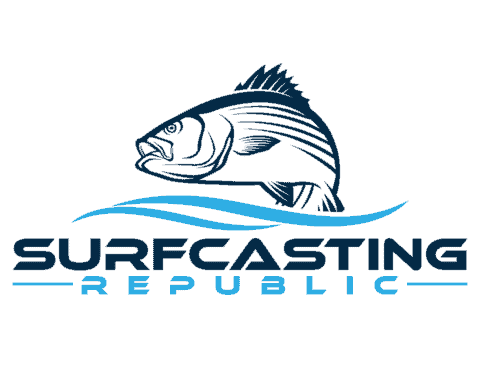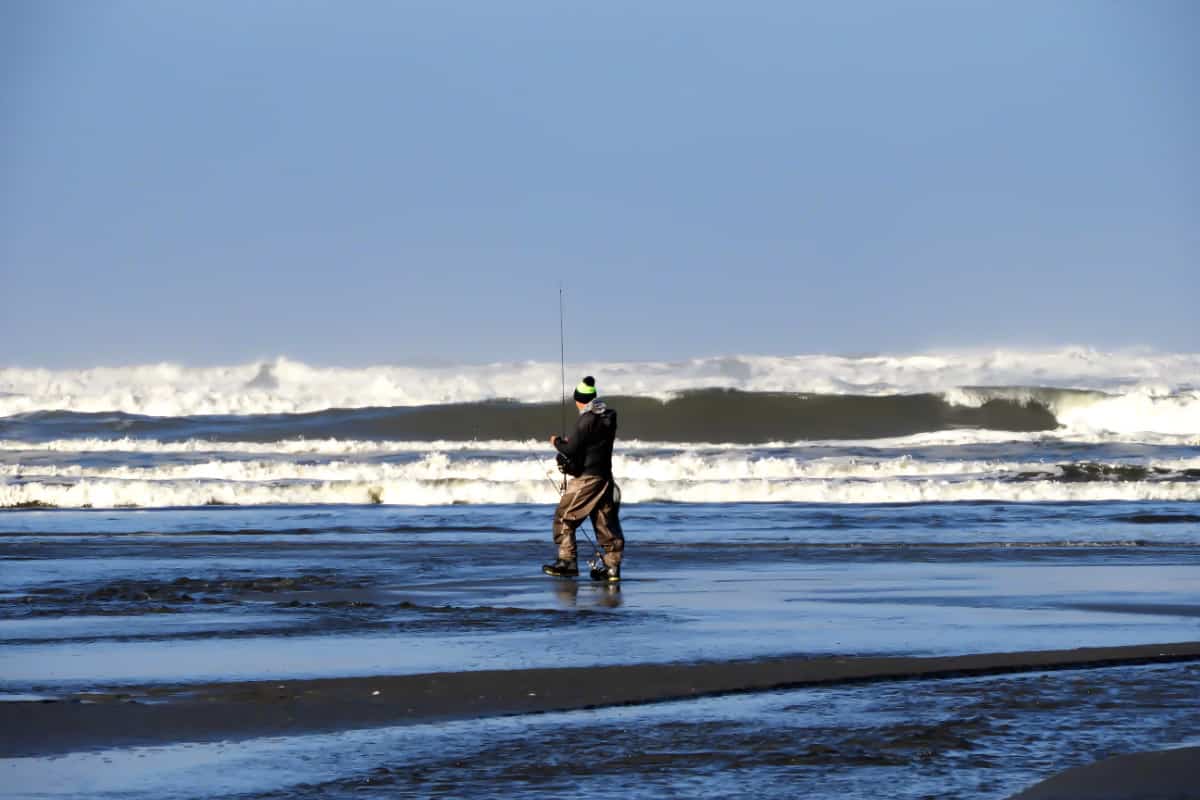When it comes to surf fishing, there are plenty of factors that could potentially throw you off your game. In addition to knowing how to time fishing trips, one of the most critical elements in grasping the opportune surf fishing moments comes down to the weather conditions. So, what sort of weather should you be aiming for?
Rain, cloudy skies, and moderate winds create the best conditions for surf fishing. However, rain shouldn’t be too heavy, and wind shouldn’t exceed 19 mph, as this will negatively impact your chances of getting a good catch.
While there are various ideal weather conditions for surf fishing, each of these conditions has many reasons why they are so effective. Understanding these reasons in relation to the behavior of the fish you’re aiming for is essential for a good catch.
Here are some of the best weather conditions that you should add to your weather forecast watch list.
What’s The Best Weather Conditions To Go Surf Fishing?
Although fish’s behavior is greatly dependant on the species, fish are generally very vigilant creatures, who steer clear of threats as far as possible.
Risks like these include predators that are hoping to feed on them, potential danger, and humans.
For this reason, they tend to feel more inclined to near the shore for feeding when there is sufficient coverage within the surf zone.
Rainy, cloudy, and windy weather creates these kinds of conditions in different ways.
Is Surf Fishing Good When It Rain?
When it rains, many ripple effects create advantageous conditions for surf fishing. Dark clouds and grey skies naturally accompany the rain.
This is not mistaken with sporadic cloudbursts, as weather conditions like this would not have the same effect.
Gloomy skies and dense clouding casts a deep shadow over the waters, creating coverage for fish and partial protection from predators within the surf zone.
Due to the lack of direct sunlight and a lack of refraction of light beneath the water’s surface.
When the raindrops fall from the sky and plunge into the waters below, it causes motion beneath the surface.
This motion shifts around elements within the surf zone like sand, sediment, and particles in the water, making the surf zone hazy.
This provides some coverage for fish to feed nearshore and will result in a higher chance of getting more bites.
Heavy rain is also frequently accompanied by high swells and stronger currents. This negatively affects smaller fish, as they struggle to swim during these kinds of conditions.
However, larger fish will feel inclined to approach the shoreline to take advantage of their prey’s defenseless position, providing you with the opportunity to reel in a heftier catch.
When it rains over a lengthened period, the build-up of rainfall on land will eventually run into larger water bodies – and probably your surf fishing spot![]() .
.
This excess water flow usually carries food scraps, bugs, and insects from land and smaller rivers.
Fish can sense changes in weather hours before they begin to take effect, and they will cling to the shoreline, knowing that the rain will bring smaller creatures and scraps for them to feed on.
What is important to note is that surf fishing and extremely heavy rainfall are not the right combinations.
Apart from the fact that fishing in general during such weather conditions is particularly dangerous, most fish species will struggle to swim if the current to too strong and the swells are too high.
They will most likely head offshore in search of a more suitable location for them to feed.
Related Post: Is Surf Fishing Good in the Rain?
Is Surf Fishing Good In Cloudy Weather?
Much like the effect of rain, cloudy skies block direct sunlight, light refraction within the water and cast dark shadows over its surface.
Since fish particularly enjoy these conditions, they will be more likely to head towards the shore to feed.
Even without the addition of rain or wind![]() , this sort of weather can result in a reasonably successful surf fishing day.
, this sort of weather can result in a reasonably successful surf fishing day.
The murky waters allow them to hide from predators while providing them with the ability to trap their prey and feed effectively.
As a result of this, there will be more fish than usual hanging around within the surf zone, increasing the potential for baiting them.
Also, these conditions create an ideal environment for your hook and line.
Since the fish’s vision within the surf zone is clouded, they will struggle to see your line, making a bite more likely.
The shadowy yet relatively still waters that usually accompany overcast days will provide a nicely balanced space for your hook to lie in waiting.
Is Surf Fishing Good When The Water Is Choppy?
Choppy water and good wave action provide great circumstances for surf fishing. When waves rise and break, the white foamy aftermath is often used by fish to hide from predators or trap their prey.
High waves also increase the amount of oxygen being exposed to the water’s surface.
This encourages fish to head towards shore and dwell in shallow waters to benefit from the surplus of dissolved oxygen
Besides, throwing out your baited line in unsettled waters will obstruct the fish from seeing your line and hook.
So, hanging around in locations where waves break and murky bubbles drape over the ripples is a good idea, as this is where fish will linger looking for food.
Much like with rainy weather, if these conditions are too extreme, then it’s not ideal for fishing at all.
In addition to this being a dangerous idea, especially hanging around where waves break, if swells are too high and the current is too strong, fish will sense danger and relocate to calmer waters.
Is Surf Fishing Good In Windy Weather?
The speed and direction of the wind![]() also play a part in creating ideal conditions.
also play a part in creating ideal conditions.
The wind directed toward the waters is generally better, as it increases casting distance and creates an offshore current that drives bait and scent into the waters.
This will most likely be picked up and followed by approaching fish until they eventually reach your bait.
The wind that is directed towards land can be beneficial in some cases, as it can draw in baitfish, attracting larger hungry fish who follow in pursuit.
However, this direction of the wind will decrease your casting distance drastically.
The wind should be relatively tame for ideal surf fishing circumstances and should not exceed 19 mph per hour. Winds that are too strong can create a bow in your line and throw off your accuracy when casting your line.
Related post: Does Wind Affect Surf Fishing?
Is It Better To Surf Fish Before Or After A Storm?
Surf fishing before a storm is said to be quite effective. Since fish can sense the storm, they will be uncertain of when they will get food again and have heightened feeding activity![]() as a result.
as a result.
The gathering clouds and condensation will add ideal conditions to these behavioral changes.
Surf fishing after a storm could go either way, as it could affect the entire ecosystem for better or worse.
It greatly depends on the changes in aquatic, atmospheric conditions![]() , the species you’re pursuing, and the storm’s strength.
, the species you’re pursuing, and the storm’s strength.
If the storm results in surface water that’s higher in oxygen or floods new areas along the shore, creating rock pools, fish will be more likely to populate the area and take advantage of them.
Drops in atmospheric pressure ![]() could result in small creatures and materials rising to the surface, which would attract larger fish.
could result in small creatures and materials rising to the surface, which would attract larger fish.
Rises in pressure could also result in good conditions depending on the species in the area.
If you aim for smaller fish, they will most likely be the first of the species to make an appearance soon after the storm.
But, if you desire larger fish, you may have to wait some time and give the ecosystem a chance to balance out again.
It’s also not always safe to go surf fishing nearing or following a storm, as the fluctuations in atmospheric![]() conditions are still sensitive and subject to change.
conditions are still sensitive and subject to change.
Make sure to check weather predictions frequently, and never go alone.
How Does Water Temperature Affect Surf Fishing Conditions?
The best water temperature for surf fishing is between 65°F and 75°F. Warmer water encourages fish to be more active and increases their metabolism, making them more likely to bite. Colder water can slow down fish activity, but certain species may still be catchable in these conditions.
Is Surf Fishing Good After A Hurricane?
Hurricanes can change the oxygen composition, atmosphere, and drastically affect fish species within that area.
Weather changes as powerful as a hurricane have the potential to endanger fish, and it’s not unusual to witness deceased fish floating to shore as a result.
With these sorts of tremendous shifts in the ecosystem, it becomes nearly impossible to predict the aftermath.
After a hurricane, there tends to be more debris and destruction than lively feeding frenzies.
However, there is a slight possibility that hurricanes could lead to a migration of species, which would be a rare but impressive catch.
Related Article: How Is Surf Fishing After A Hurricane?
Summary
It’s essential to understand the reasons why atmospheric changes in rain, clouds, and wind can affect the behavior of fish so that you can find the right balance for each of these weather conditions.
Check out your local rain, clouding, wind, and related tide predictions to spot some ideal yet safe weather for you to go surf fishing.

